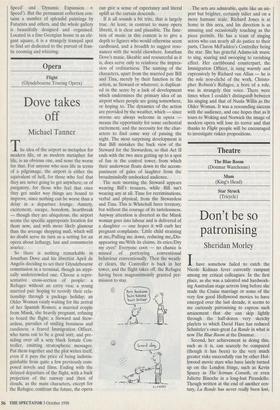Opera
Flight (Glyndebourne Touring Opera)
Dove takes off
Michael Tanner
The idea of the airport as metaphor for modern life, or as modern metaphor for life, is an obvious one, and none the worse for that. For anyone who sees life in terms of a pilgrimage, the airport is either the equivalent of hell, for those who feel that they are never going to get anywhere; or of purgatory, for those who feel that once they get under way things are bound to improve, since nothing can be worse than a delay in a departure lounge. Anxiety, excitement, escape, boredom, heartbreak — though they are ubiquitous, the airport seems the specific appropriate location for them now, and with more likely glamour than the average shopping mall, which will no doubt serve its turn as a setting for an opera about lethargy, lust and consumerist avarice.
So there is nothing remarkable in Jonathan Dove and his librettist April de Angelis deciding to set their Glyndebourne commission in a terminal, though an atypi- cally undercrowded one. Choose a repre- sentative cross-section of people: a Refugee without an entry visa; a young married pair hoping to revivify their rela- tionship through a package holiday; an Older Woman vainly waiting for the arrival of her Spanish Romeo; a married couple from Minsk, she heavily pregnant, refusing to board the flight; a Steward and Stew- ardess, parodies of smiling bossiness and randiness; a feared Immigration Officer, who turns out to be a good sort; and pre- siding over all a sexy black female Con- troller, emitting stratospheric messages. Put them together and the plot writes itself, even if it pays the price of being indistin- guishable from quite a few previously com- posed novels and films. Ending with the delayed departure of the flight, with a back projection of the runway and then of clouds, as the main characters, except for the Refugee, confront the future, the opera can give a sense of expectancy and literal uplift as the curtain descends.
If it all sounds a bit trite, that is largely true. At least, in contrast to many opera libretti, it is clear and plausible. The func- tion of music in this context is to give a depth to figures who would otherwise seem cardboard, and a breadth to suggest reso- nances with the world elsewhere. Jonathan Dove's music, likeable and resourceful as it is, does serve only to reinforce the impres- sion of ordinariness. The naming of the characters, apart from the married pair Bill and Tina, merely by their function in the action, as Steward or whatever, is duplicat- ed in the score by a lack of development which undermines the primary idea of an airport where people are going somewhere, or hoping to. The dynamics of the action are provided by the weather, which — since storms are always welcome in opera means the opportunity for some orchestral excitement, and the necessity for the char- acters to find some way of passing the night. The most surprising development is that Bill mistakes the back view of the Steward for the Stewardess, so that Act II ends with the two men getting up to a spot of fun in the control tower, from which their underwear floats down to the accom- paniment of gales of laughter from the broadmindedly unshocked audience.
The next morning the Steward appears wearing Bill's trousers, while Bill isn't wearing any at all. Time for recriminations, verbal and physical, from the Stewardess and Tina. This is Whitehall farce territory, but without the courage of its tastelessness. Anyway attention is diverted as the Minsk woman goes into labour and is delivered of a daughter — one hopes it will curb her pregnant complaints: 'Little child straining at me,/Pulling me down, reducing me,/Dis- appearing me/With its claims, its cries:/Dry my eyes!' Everyone coos — no chance is missed of portraying conventional behaviour conventionally. Then the weath- er clears, the Controller is back in her tower, and the flight takes off, the Refugee having been magnanimously granted per- mission to stay. The sets are admirable, quite like an air- port but brighter, certainly tidier and on a more humane scale. Richard Jones is at home in this area, and his direction is as amusing and occasionally touching as the piece permits. He has a team of singing actors who can nearly all do justice to their parts, Claron McFadden's Controller being the star. She has grateful Adams-ish music to sing, soaring and swooping to ravishing effect. Her earthbound counterpart, the Immigration Officer, is sung warmly and expressively by Richard van Allan — he is the sole non-cliché of the work. Christo- pher Robson's Refugee, a bore of a role, was in strangely thin voice. There were times when I couldn't distinguish between his singing and that of Nuala Willis as the Older Woman. It was a resounding success with the audience, and one hopes that as it tours to Woking and Norwich the image of modem opera will lose its terror and that thanks to Flight people will be encouraged to investigate riskier propositions.










































































 Previous page
Previous page